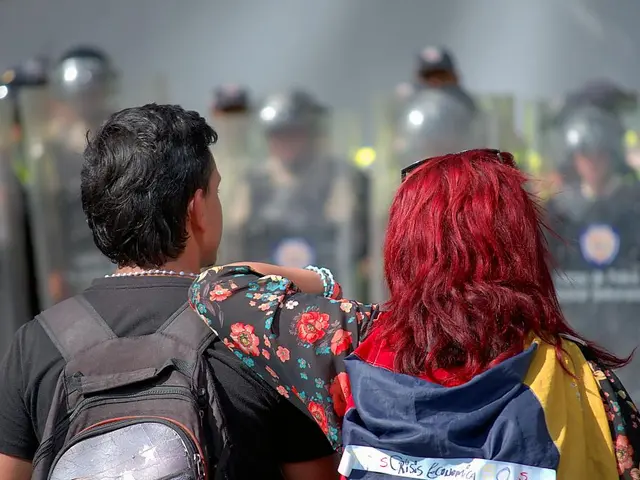U.S. Crypto Heist: Citizen from Bat Yam Arrested for $186 Million Cryptocurrency Theft
Hackin' Alexander, A Cyber-Thief On The Run
Meet Alexander Gurevich, a 47-year-old hacker with a penchant for stirring trouble. This Russian-Israeli citizen from Bat Yam had quite the adventure recently. On May 1, he was caught red-handed at Ben-Gurion Airport, attempting to make a getaway to Russia under the alias "Alexander Block."
The FBI's been hot on his tail since 2022, when he allegedly pilfered millions from a California-based blockchain company named Nomad. According to U.S. officials, he's been charged with computer crimes, money laundering, and the transfer of stolen digital property. The details of his nefarious deeds had remained under wraps, until his capture in Israel last week.
So, what exactly did this mastermind do? Well, he took advantage of a weakness in Nomad's system and made off with around $2.89 million in crypto tokens. Just days later, other hackers hopped on the bandwagon, exploiting the same flaw, draining nearly $186 million in total, sending shockwaves through the company.
Now, here's where things get interesting. Gurevich made contact with Nomad's Chief Technology Officer, James Prestwich, on Telegram, confessing to his spying activities and apologizing for the mess he'd caused. He returned $162,000 of the stolen funds but also demanded a $500,000 reward for pointing out the vulnerability.
Not satisfied with the meager return, Gurevich then changed his name on April 29 and received a passport under his new identity the very next day. On May 1, he was caught at the airport before boarding a flight, thanks to the keen eyes of Israeli authorities. He made his first appearance in court the following day, in handcuffs.
The Israeli State Attorney's Office International Department petitioned the Jerusalem District Court on May 2 to declare Gurevich extraditable. Justice Minister Yariv Levin had signed the order for Gurevich's court appearance shortly after his return to Israel on April 19, the second day of Passover.
Gurevich, who'd acquired Israeli citizenship in 2017, had been jet-setting around the globe for the better part of the last few years, spending time in Africa. He was indicted in the U.S. in August 2023 on eight federal counts. The charges in America carry sentences of up to 20 years, much higher than the three-year maximum for similar offenses in Israel. U.S. prosecutors filed the extradition request in December 2024.
Currently, Gurevich is being held in Israeli custody by the orders of Judge Einat Avman-Moller. He's being represented by the Public Defender's Office. The arrest was orchestrated by the Israel Police National Fraud Unit and the Tel Aviv Fraud Division.
In the world of cybercrime, the cat-and-mouse game between hackers and authorities never ends. But in this case, the mouse didn't make it to Russia. Keep it locked for more updates on this thrilling, real-life cyber heist.
Also Read: Deribit Prepares to Storm the U.S. During Trump's Crypto Revolution
- Alexander Gurevich, the cyber-thief, allegedly transferred millions worth of crypto tokens from a California-based blockchain company named Nomad in 2022, an incident that sent shockwaves through the general-news realm.
- In a strange twist, Gurevich, one of the key figures in the crime-and-justice sphere, reportedly contacted Nomad's Chief Technology Officer, James Prestwich, on Telegram, confessing to his hacking activities.
- Despite the ongoing investigation and charges against him for computer crimes, money laundering, and transfer of stolen digital property, Gurevich tried to escape justice by changing his identity and attempting to flee to Russia.
- The Israeli State Attorney's Office International Department petitioned the Jerusalem District Court to declare Gurevich extraditable, initiating a legal battle that could see him face the music in the U.S., where punishments for such crimes are harsher under cybersecurity and technology laws.
- The cybersecurity technology landscape continues to grapple with cases like Gurevich's, illustrating the ongoing need for improved safety measures and cooperation between global law enforcement agencies in pursuit of justice for such crypto-related crimes.








